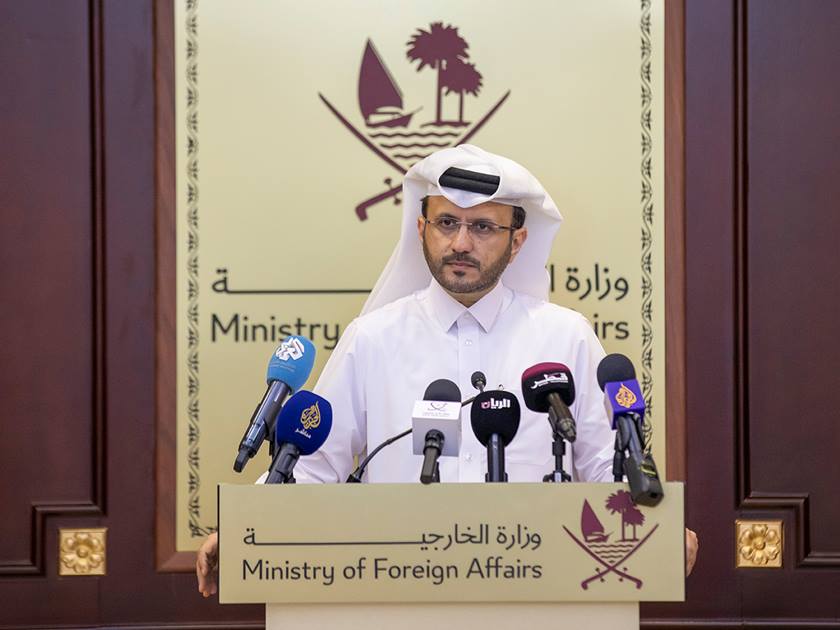Despite its major diplomatic efforts, Qatar was subjected to criticism by Israeli officials and some U.S. diplomats who have attempted to portray its mediation efforts in a negative light.
Qatar has called to disregard media reports “attempting to cast doubt” over its ongoing mediation efforts between Israel and Hamas, Doha’s state news agency (QNA) reported on Wednesday.
QNA cited remarks by Qatar’s foreign ministry spokesperson, Majed Al Ansari, who stressed the need to focus on all efforts during “this sensitive time” on ending the war in Gaza.
“Dr. Majed bin Mohammed Al Ansari announced the State of Qatar’s call to disregard media reports attempting to cast doubt and level accusations against the ongoing mediation efforts to halt the aggression in Gaza,” QNA reported.
The Qatari official added that his country’s mediation efforts with Egypt and the United States are ongoing.
He noted that the three parties “are working in full coordination to achieve an immediate and lasting ceasefire in Gaza and the exchange of prisoners and hostages,” something that he said would result in regional peace and stability.
The Gulf diplomatic broker has been at the forefront of mediation efforts since the beginning of Israel’s genocidal war in Gaza on October 7, 2023.
Qatar has hosted the Hamas political office since 2012 at the U.S.’ request in order to maintain a channel of communication.
Late last year, Qatar, alongside Egypt, mediated a week-long truce between Hamas and Israel that lasted between November 24 and December 1.
At the time, the deal enabled the release of 109 captives from Hamas in exchange for the release of 242 Palestinian women and child prisoners from Israeli prisons.
But Israel has since re-arrested some of those it released as it doubles its detainment campaign in the West Bank.
The ceasefire talks have stalled since the truce expired. Israel’s invasion of the Gaza-Egypt Rafah Crossing on May 6 has been a major factor that contributed to the stalemate.
Despite its major diplomatic efforts, Qatar was subjected to criticism by Israeli officials and some U.S. diplomats that have attempted to portray it in a negative light.
This was seen in January when Israeli Prime Minister Benjamin Netanyahu described Qatar’s mediating position as “problematic” in leaked audio recordings. Netanyahu then said he stood by his inflammatory remarks.
Then, on April 4, Israel’s economy minister Nir Brakat accused Qatar of being “untrustworthy” and “a threat to peace” in the world in an interview with Bloomberg.
On May 5, diplomatic sources told Al Jazeera Arabic that Qatar remained committed to its “honest mediator role” between Israel and Hamas and stressed that it will not accept being used a tool to put pressure on any party.
“The sources said that Qatar would not allow interference from any party that would affect the integrity of its role,” Aljazeera reported.
On April 17, Qatar’s Prime Minister Sheikh Mohammed bin Abdulrahman Al-Thani called out the “exploitation and abuse” of his country’s diplomatic efforts and said Doha is “re-evaluating” its mediation role.
“Unfortunately, we have seen that there is a misuse of this mediation for narrow political interests, and this necessitated the State of Qatar to carry out a comprehensive evaluation of this role[…] and evaluate how all parties engage in this mediation,” Sheikh Mohammed, who is also Qatar’s foreign minister, said at the time.
On May 5, the Israeli government decided to shut down Al Jazeera’s bureau in Israel, a move that the Qatar-based network described as “a criminal act” that violated the access to information.
The war has neared its eighth month, with at least 35,709 people killed by Israel in Gaza and more than 85 percent of the population internally displaced.
The invasion of the vital Rafah Crossing has stopped the entry of aid and evacuations of wounded as well as those desperately fleeing the war.
Qatar’s foreign ministry spokesperson told a weekly press briefing in Doha on Tuesday that the latest developments in Rafah are “unacceptable” and increased the “targeting of civilians.”
Al Ansari “underscored that any escalation on the Gaza Strip disrupts the efforts of ending the crisis” while stressing that “Qatar will never accept a second Nakba (setback).”
Meanwhile, on Monday, the International Criminal Court (ICC) said it sought arrest warrants against Netanyahu and Israeli Defense Minister Yoav Galant over the war on Gaza.
Al Ansari had said that while Qatar is not a party to the ICC, “there are clear violations of international law” being committed by Israel.
“The call by Israeli officials to attack aid convoys to Gaza is moving from individual to institutional practices and represents a case of collective punishment that cannot be accepted,” Al Ansari said.







